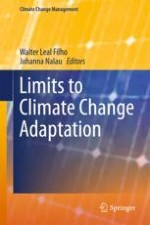2018 | OriginalPaper | Buchkapitel
11. Local Adaptation to Climate Extremes in Domboshawa: Opportunities and Limitations
verfasst von : Vincent Itai Tanyanyiwa, Rejoice Madobi
Erschienen in: Limits to Climate Change Adaptation
Aktivieren Sie unsere intelligente Suche, um passende Fachinhalte oder Patente zu finden.
Wählen Sie Textabschnitte aus um mit Künstlicher Intelligenz passenden Patente zu finden. powered by
Markieren Sie Textabschnitte, um KI-gestützt weitere passende Inhalte zu finden. powered by
